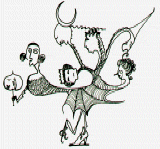|
Very fine Early 19th Century fully
fitted Papier mâchè sewing box Circa
1820.
Please click on images to enlarge
Reference: Sb101
Description:
An artist painted Papier
mâchè sewing box having its original fully fitted tray with
Dieppe
turned and carved spools
and sewing tools.
Original lock and key.
Origin: United Kingdom
Circa: 1820
Materials: Papier
mâchè
Size: 23cm wide by 17.5cm, 8cm high including feet: 9.1
inches 6.9 inches 3.2 inches high
Condition: very good.
|

|

|
Inside there
a fully fitted tray with Dieppe turned
and carved spools
and sewing tools. There is fine gold leaf decoration on the facings.
The sides of the box are
decorated with stylized swags of foliage in gold.
|
Please click on images to enlarge

|
The Scene is finely painted
with mastery of light and shade
The painting depicts a
mountainous landscape. In the background the sea with sailing dinghies
meets the cloudy sky. In the foreground are two fowlers one having just
discharged his gun. Their dog is still at their side. The bird
would not be ease for the dog to retrieve.
|
Please click on images to enlarge
This is Dieppe turning and carving. The material is ivory.
The top screws onto the body Screws are a show off until later. Hand turned screws in
wood or ivory are not easy to make. The materials are usually expensive to
the craftsman. after turning this has been decorated. The external
turning of the lid piece is probably done with a pre or part preformed
shape. With ivory and wood the grain patterns sometimes required a scraping
cut.
|

|

|
This tool is
used for cleaning needles. When in use it would be filled with sand. |
Please click on images to enlarge
| The spools are made
from both ivory and bone. The tops are ivory. |

|

|
The spool tops
are turned carved and milled the central flower even has the
veins in relief. the line of beads is sometimes in 18th Century Russian
ivory carving.
|
Please click on images to enlarge

|
The ivory winding clamps are
also Dieppe work
|
Papier mâchè substances
were known in England as early as the 17th century when they
introduced from Persia and the east via France. It provided a smooth
base for painting.
|

|
Please click on images to enlarge

|
Original lock and key.
|
Please click on images to enlarge
Please click on images to enlarge
Please click on images to enlarge

|
There are two thimbles in the box. one is a
professional tool
a gnarled iron ring. the other is a Dorkas Thimble, Daisy. Design D. ,
marked C H, for Charles Horner, the inventor.
Charles Horner took out patents in both England (1884, ) and two years
later in the US (1889). The process to get a US patent took from
1886 to 1889.
It is not surprising that a Dorkas
thimble is in this box. It was the
best real thimble. It was designed for use and feel.
Dorkas Thimbals
"A thimble composed of an outer casing and an inner lining, both
of precious metal, in combination with a steel core interposed between
said casing and lining, substantially as set forth, whereby a thimble
having the appearance of the precious metal and the durability of steel is
formed."
|
News
| Buying
| email | Online
History of boxes | The
Schiffer Book
All text and images and linked images are ©
1999-2004 Antigone Clarke and Joseph O'Kelly. If you require any further
information on permitted use, or a licence to republish any material, email us
at copyright@hygra.com
| 